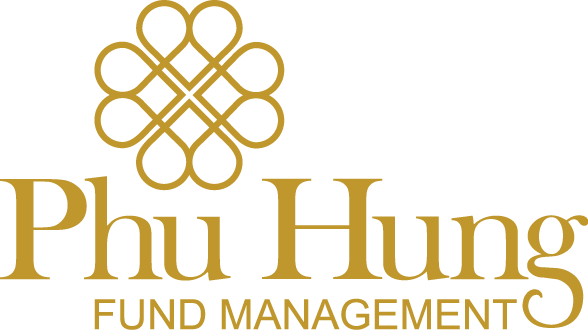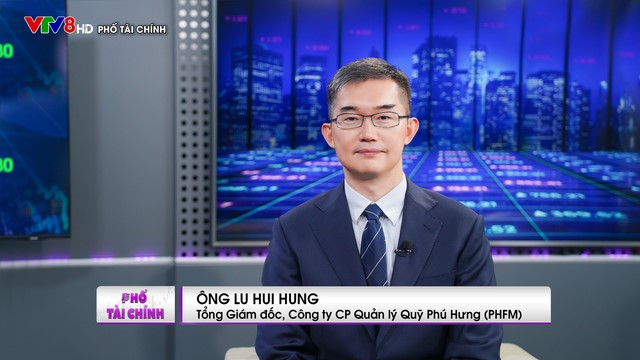VTV.vn – Since July 2023, the global stock market has witnessed a positive return of cash flow from investment
Cash flows into global stock funds have risen for the third month in a row, as the global economic outlook becomes more optimistic. In Vietnam, a series of policies have been implementing to support its core economy, but the stock market has not attracted more foreign capital.
Experts at The Finance Street Talk Show on VTV8 said that there are many factors that lead to the lack of foreign capital flows. However, they predicted that from 2024 onwards, emerging markets and Vietnam will see more global money as interest rates stabilize and the world economy recovers its growth momentum.
Mr. Lu Hui Hung, General Director, Phu Hung Fund Management Joint Stock Company (middle) at The Finance Street Talk Show
The following are excerpts from outstanding market information on the Finance Street Talk Show from Mr. Lu Hui Hung, General Director, Phu Hung Fund Management Joint Stock Company.
MC Mui Khanh Ly: The world economy is expected to have a “soft landing” in 2023, instead of facing the challenges that were predicted earlier this year. What is your opinion on this?
Mr. Lu Hui Hung: As we can see, Quarter 2 GDP figures of major economies around the world are better than market expectations, especially the figures in developed countries such as US, EU and Japan. Many major international organizations, including the World Bank, IMF, and OECD, adjusted their global GDP forecasts higher and have a more optimistic outlook on the world economy this year. This is a positive scenario because not long ago, the market was still worried about an economic recession that would happen this year. Up to now, with positive economic data were released, we believe that most of economic entities have been showing signs of improvement and starting to move up from the bottom. However, there is a possible black swan we need to pay very close attention – namely the impact from “Hard landing” of China’s economy.
MC Mui Khanh Ly: And with positive expectations, the global capital flow has shown a clear improvement in July and August. Which direction do you think the global capital flow will go in the near future?
Mr. Lu Hui Hung: Usually, the stock market reacts around 6 to 8 months earlier than the macroeconomic situation, so we can see most of the world’s major stock markets have recorded significant rally since the beginning of the year (YTD: S&P 500 +13.6%, Nasdaq +34.3%, Nikkie +21.74%, EuroStoxx 50 +11.05%), Vietnam also reported a 12.58% YTD rise. We understand that the improving economic forecast has supported the rebound, but the market now is a little over-optimistic.
As I mentioned above, the world economy is expected to have a soft landing, through which policy rates in developed countries/regions such as the US and EU will maintain at a high level for longer; along with the gradual balance sheet reduction of the Fed & ECB, and the instability in the US banking system after the rating downgrade. Cash flow will tend to rebalance and reduce the proportion of risky assets in the near future. Inevitably, the Vietnamese stock market may also encounter the possible decrease in foreign investment at that time. However, we think the pressure will only maintain in short term until the hot cash flow has been balanced. From 2024 onwards, it is expected that cash flow will return back to emerging markets when the factors related to interest rate cool down and the global economy can regain a clearer growth momentum.
MC Mui Khanh Ly: Vietnam’s economy is on a positive recovery track, with the stock market on the rise and market liquidity increasing sharply to billions of USD per session. In your opinion, does the Vietnamese market have a lot of potential and opportunities currently?
Mr. Lu Hui Hung: Vietnam’s stock market recovered quite well in the recent period thanks to optimistic expectations from the Government’s policy rates reductions and effective solutions to unclog capital from banks to businesses. Trading value in August increased strongly and reached about USD 1 billion in average per session (nearly double as compared to the average from Jan to May).
However, as we have mentioned, the stock market in the short term will encounter some risks related to the possible decrease in foreign investment as well as the business condition of domestic enterprises. Slow credit growth is revealing that enterprises are still face difficulty to access in new capital. Year to date, credit growth has only reached 4.39% compared to the government’s target of 14%. Money flow is still stuck in the secondary market, causing interbank interest rates at short terms (ON, 1 week) to remain below 1%. In addition, the economic risks of China (such as slow economic growth, depressed real estate market, CNY depreciation etc.) will also affect the VND exchange rate and cause reduction of risk appetite of the whole stock market.
In the medium and long term, the Vietnamese stock market will be supported by many bright spots. Vietnam’s economic growth rate is forecasted to outpace reginal and global average. Stable exchange rate and inflation, which are expected to meet the government’s target, are also important factors to attract foreign inflows. Combining with the rise of middle class which will exceed over 50% by 2035 and generate investment demands, we strong believe that the development of Vietnam’s stock market in the long term is very promising.
(Picture source: The Finance Street Talk Show)
MC Mui Khanh Ly: Although FDI inflows into Vietnam have improved in the past, FII inflows remain unstable and the stock market is still dominated by domestic cash flow. What do you think about this?
Mr. Lu Hui Hung: FDI inflows, representing long-term capital flows into Vietnam, have recorded many positive signals. Total FDI in the first 7 months reached over 16 billion USD, up 4.5% YoY. This indicates the economic partners, especially traditional ones such as Singapore, Japan, China, Korea, have strong confidence on Vietnam’s economy in the long run.
However, regarding the FII flow which is more related to M&A deals, we still don’t see any other big deal like VP Bank’s deal this year. The pressure from the high USD interest rate as I mentioned above and the process of restructuring the corporate bond market and the real estate market currently have slowed down FII capital flow. The 2024 outlook is likely to be much better, some deals can be expected including capital increase of banks and the divestment of state-owned enterprises.
In the short term, we believe that when the Q2 earnings reporting season is over, the market will enter a period of information “low-lying”. Foreign flows, suppressed by unpredictable prospect of global, will temporary withdraw from emerging markets. Domestic cash flow, as a result, will be the main driving factor. However, when global economy situation become stabilized, money flow still need to come back emerging markets and Vietnam will for sure be an important destination for foreign capital flows.
MC Mui Khanh Ly: What is your outlook on the future development of the Vietnamese market?
Mr. Lu Hui Hung: In my opinion, the combination of the macro factors analyzed above and the robust cash flow into the market will be sufficient to support the market in the upcoming uptrend. In the short term, it will be difficult to have a significant hit but we believe the market can reach 1,300 points this year. Next year, when factors become clearer such as the economy recovering more positively and businesses with better profit growth, the market will likely reach the 1,500 point mark again. The current market valuation is about 14 times, a reasonable level and we expect that in the future the market P/E level will continue to increase.
MC Mui Khanh Ly: With your expertise, you have been acted as a “bridge” between foreign investors and Vietnamese market, what are your solutions that help to promote the development of Vietnam’s stock market?
Mr. Lu Hui Hung: In the context that Vietnam’s stock market is recovering and entering a growth phase, PHFM will continue its role as a “bridge” connecting the Vietnamese market with foreign investors by focusing on key solutions such as: continue to improve our digital products to increase accessibility for investors; Improve capacity for risk management and monitoring. We diversify our investment products such as open-ended funds and ETFs. At the same time, we work with relevant parties to introduce investment opportunities in the Vietnamese stock market through professionally managed investment funds.
Phu Hung Fund Management Joint Stock Company (PHFM) has always accompanied the development of Vietnam’s stock market for nearly 2 decades. In addition to Investment Advisory service and Portfolio Management service, we also just launched our first equity mutual fund – the Phu Hung Vietnam Select Investment Fund (PHVSF). This new fund focuses on providing new choice for local and foreign investors who would like to invest in good stocks listed on HOSE and HNX. We also officially launched our PHFM Trading mobile apps to help investors open accounts and trade fund certificates online quickly, safely and effectively.
As part of Vietnam’s stock market, PHFM closely will follow the directions and instructions from the State Security Commission of Vietnam to promote the growth of Vietnam’s stock market.
Source: Content was excerpted from interview from The Finance Street Talk Show – VTV.vn


